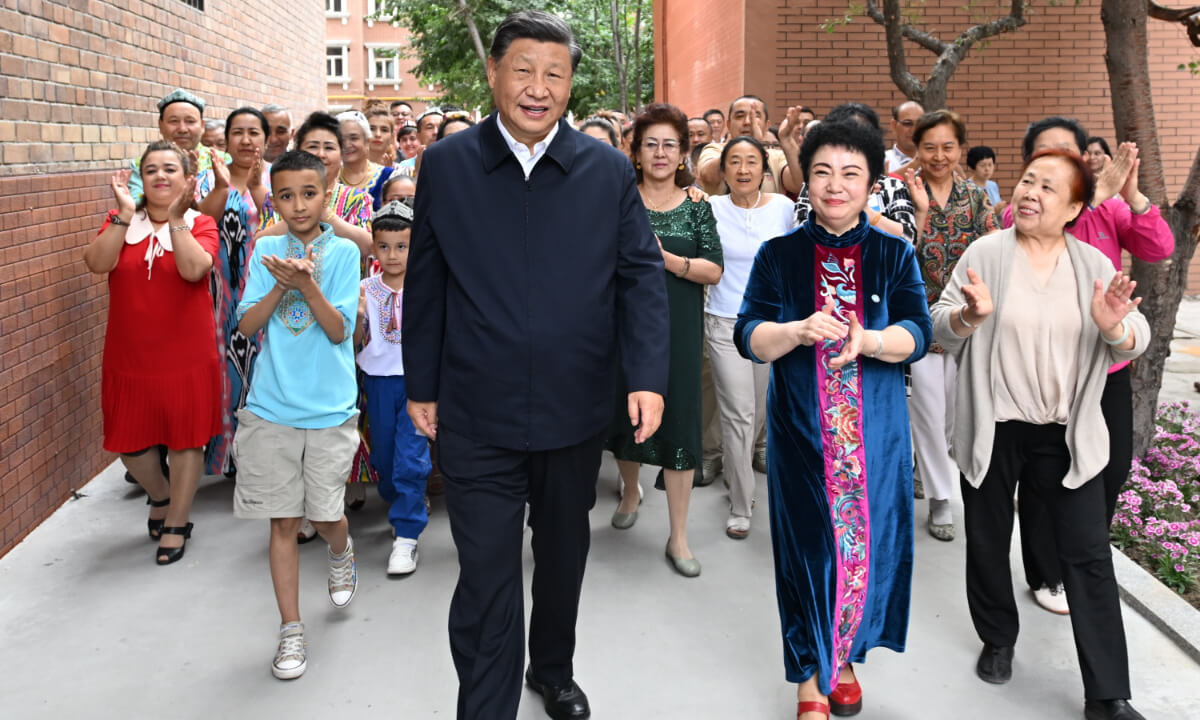China has secretly been lobbying against the publication of a highly anticipated United Nations (UN) report on the situation of human rights in the country’s Xinjiang province.
According to a document circulating among UN officials, Chinese authorities told the UN in a letter that the “so-called assessment” of the controversial region “is of grave concern” to the Chinese leadership. It added that if the report is published, it “will intensify politicisation and bloc confrontation in the area of human rights, undermine the credibility of the [Office of the UN High Commissioner for Human Rights], and harm the cooperation between OHCHR and member states.” “We strongly urge Madame High Commissioner not to publish such an assessment,” it states. The plea document was seen by Reuters and its authenticity was confirmed by diplomats from three recipient countries.
Liu Yuyin, a spokesperson for China’s diplomatic mission in Geneva, did not confirm the letter, claimed that close to 100 countries have backed China on the Xinjiang issue and stated their “objection to interference in China's internal affairs under the pretext of human rights.”
Exclusive: China is asking the U.N. human rights chief to bury a highly-anticipated report on human rights violations in Xinjiang, according to a Chinese letter seen by @Reuters and confirmed by diplomats from three countries who received it https://t.co/0pUbrTwux7 pic.twitter.com/DHM292ySjx
— Reuters (@Reuters) July 20, 2022
The news comes only two months after UN High Commissioner for Human Rights Michelle Bachelet went on a six-day official visit to China, which also included a visit to Xinjiang. However, Bachelet’s visit was “conducted in a closed-loop,” which prevented the UN chief from holding any spontaneous in-person meetings with anyone who was not pre-verified by the Chinese government. Both sides also agreed to prohibit media officials from the delegation.
On her return from Xinjiang, Bachelet intended to further update the report and then forward it to Beijing to review for “factual comments” before publication. As of now, it is unclear if Beijing has seen the revised report. The report is believed to contain details on China’s alleged human rights violations against the Uyghur Muslims as well as other minorities in the region.
Calls for a visit by the OHCHR to the Muslim-majority Chinese autonomous region of Xinjiang gained further momentum after the BBC published its own report last February in which it found evidence of Uyghur women who have been “systematically raped, sexually abused, and tortured” in the supposed “re-education camps”. Several former detainees and a guard gave the BBC rare first-hand accounts of what goes on inside the internment camps, reporting that “they experienced or saw evidence of an organized system of mass rape, sexual abuse, and torture.”
"Against this polarised backdrop, ISHR addressed the Human Rights Council to recall the extensive documentation compiled by UN experts over the past four years, and urge Bachelet to present her Xinjiang report to the Human Rights Council."
— CHRD人权捍卫者 (@CHRDnet) July 11, 2022
Yes. Where is the report, @mbachelet? https://t.co/YyrnY573li
Bachelet, a former president of Chile, has been negotiating to gain access to China’s western Xinjiang province since September 2018 in order to look into the several allegations. She has also been under increasing pressure from the West to secure unrestricted access to the secretive Chinese province, where at least one million Uyghurs, a largely Muslim ethnic group, are reported to have been detained. Bachelet’s May trip marked the first country visit by a UN High Commissioner for Human Rights to China since 2005.
China has also previously requested Bachelet’s office to hold off on publishing the report on Xinjiang ahead of the Beijing Winter Olympics, thwarting intense pressure from the US. Last September, the UN’s human rights office announced that it was finalising its assessment report of the situation in Xinjiang and added in December that the office was expecting to publish its report soon. However, despite immense pressure from Uyghur activists as well as from Western governments, Beijing’s coercion has so far succeeded in repeatedly delaying the publication of the report.
Commenting on this delay, a senior European diplomat told the South China Morning Post that the document was shrouded in doubt due to China’s influence. “As far as I understand, China is lobbying very hard in Geneva to kill the report. So will there be a report? I’m not sure.” “The UN system today is very dependent on China, which is a problem,” the source added.
However, Chinese foreign ministry spokesperson Wang Wenbin said in a press conference on Wednesday that Bachelet “saw first-hand China’s human rights path and progress,” describing Xinjiang as a “secure and stable” region with “robust development” and “happy and fulfilled” people. He thus opposed what Beijing views as a “smear” campaign of “political manipulation” to “tarnish China’s reputation.”
Bachelet, meanwhile, has pledged to release the report before she completes her term at the end of August.

